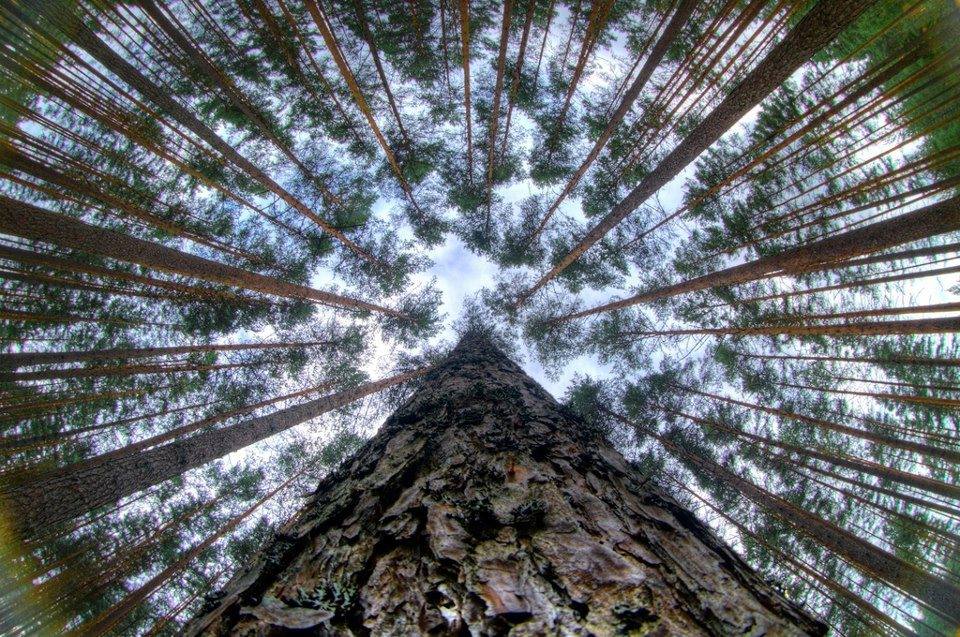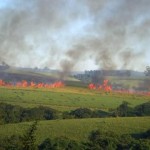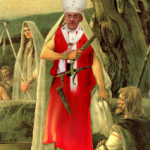[Note: It was initially represented to me by Amy Blackthorn that the Sunday Stew had declined to publish this interview because I missed the deadline. Since then, the editor of the Sunday Stew, Kallan Kennedy, has advised me that she declined to publish the interview because of a post I wrote here at The Allergic Pagan. I’m saddened by the loss of any person’s support for A Pagan Community Statement on the Environment. I’m surprised that anyone would decide not to support the Statement because of something that I or any other individuals has written. I did not write the Statement, and mine is just one signature out of over 6,500 people. I did not think this needed to be said, but apparently it does: Anything I write on this blog represents the views of just one person, and is not representative of the group that drafted the Statement, nor is it representative of the over 6,500 people who have signed the Statement. A Pagan Community Statement on the Environment is far, far bigger than me. It belongs to all those who have signed it. Furthermore, as I have written previously here, “I respect the choices of those who have chosen not to sign the Statement, and those who have chosen to sit with it a while before deciding whether to sign, and those who wrestled with it and ultimately chose to sign it. I want to be clear here that there are principled reasons for Pagans, whatever their path, to sign or not sign the Statement.” To any person who takes issue with me or the opinions I have expressed here, I encourage them to weigh the importance of such concerns against the importance of taking collective action as Pagans in face of the climate crisis.]
I was recently interviewed by Amy Blackthorn from the Sunday Stew about “A Pagan Community Statement on the Environment.” Due to communication difficulties on my end, the interview could not be published at the Sunday Stew, so instead it is published here in full.
What led to the creation of the petition?
What prompted me to call for the creation of the a Pagan Community Statement on the Environment was my own growing ecological awareness, which coincided with the publication in August 2014 of an environmental statement by the Covenant of the Goddess. The CoG statement highlighted for me the the absence of other such statements among Pagans. So I created a Facebook group and began inviting Pagans to come together to draft a Pagan Community Statement on the Environment. Membership in the group was open to anyone who self-identified as Pagan or part of the Pagan community, and a special effort was made to invite individuals from a variety of different Pagan traditions, with the understanding that no such group could be truly representative of the diversity of the Pagan community. Ultimately, a group of between 40 and 50 individuals contributed to the draft statement to varying degrees.
Did the petition grow out of your own spiritual dedication?
My call for the creation of the statement did grow out of my own spiritual quest. Over the course of 2014, I had several experiences which led to the awakening of an ecological consciousness in me and a transformation of my orientation to Paganism. After attending Pantheacon 2014, I came to terms with the fact that I was not interested in developing a devotional relationship with deities, but that I was interested in developing a devotional practice with the earth itself. In July, I visited Pando in central Utah with my family. Pando is grove of interconnected aspens which is the largest living organism on the planet. While there, my wife led me and her largely Mormon family in a simple but beautiful ritual of thanksgiving and connection. The next day, we spent the night in the mountains and I laid out watching the Milky Way stretch from horizon to horizon.
After returning home, I saw a movie, “Lucy”, which had nothing to do with the environment on its face, but in it the heroine experiences a profound a shift of consciousness toward what I would describe as identification with the cosmos. When I left the movie, I actually began experiencing this myself. Around the same time, I was discovering the writings of John Muir and Rachel Carson, which inspired me to explore deep ecology. Then came the release of the Covenant of the Goddess statement on the environment. Soon thereafter, in September, the People’s Climate March was held and the growing sense of urgency I was feeling around this issue peaked.
Was there an ‘ah ha’ moment?
For me, yes there was. I’m a little embarrassed about it, because I think it should have happened on a mountaintop or standing by the ocean. I guess we don’t get to pick the time and place of our epiphanies. It was the movie “Lucy”. The climax of the movie is a montage of images in which the heroine, Lucy, experiences a connection to both her remote ancestral past — in the form of her primate ancestor “Lucy” — and to the universe as whole — in the form of mind-blowing macrocosmic vistas. As I walked out of the theater, I had this intense feeling of both our infinitesimal insignificance and our inestimable consequence as a species. I don’t know if this was the intent of the movie, but I was left with an intense feeling both of radical dissociation from the everyday concerns of my life and of deep responsibility to the universe as a whole.
Since the press release went out, how has feedback for the movement surprised you?
I was surprised by the lack of controversy. A few individuals expressed concern with specific parts of the statement, feeling that it either was too specific or not specific enough, or that it went too far or didn’t go far enough. But in spite of this, thousands of people felt that the urgency of the message justified harmonizing their voices with other Pagans at this time in history. Over 6,000 people have now signed. By and large, the statement has been received as it was intended: not as a declaration for all Pagans, but as an invitation to join your voice to those of the other signatories in defense of all life on Earth.
How has your view of the environment and our impact on it changed since you created this petition?
Leading up to my call for the creation of the statement, an ecological consciousness was dawning in me. By that I mean, I came to realize that I was not who I thought I was. I am not my mind. Even my body is not my own, but is colonized by other living organisms, just as we colonize Gaia. My skin, the boundary by which I measure where “I” end and “it” begins, is not solid after all, but is permeable, the thinnest of veils. I realized that I am a small, but radically interconnected, part of this vast earth — which is itself a part of an even vaster cosmos — a part of the earth that has recently become conscious of itself, and as such has special responsibilities.
Did creating the petition deepen your connection to your personal gnosis?
The process of helping to create the statement did cause me to develop a deeper appreciation of the need for collective action. As Pagans, our place is at the forefront of the global movement calling for change in our collective relationship with the Earth. However, in some ways, we are behind the curve. While we can come together for ritual and often, in the short term, for direct action, we sometimes falter when it comes to speaking with harmonious voices on critical issues of the day like climate change. Our actions, while laudable, may not be understood by the non-Pagan public as well as they might be if we could join our voices in protest as well as we
can join our bodies and souls in ritual. As a result, the effectiveness of our actions may sometimes be diminished by the cacophony of our diverse voices.
I use the word “harmonious” deliberatively. Speaking “in harmony” with each other does not necessitate us all being of one mind or agreeing on every point. We Pagans often speak of attuning ourselves to nature and the cycles of the Earth. We should also be able to “attune” to one another, temporarily setting aside our egos and prioritizing our individual disagreements, when a collective voice is urgently needed to effect change, as it is now. If there is any issue on which we Pagans should be able to speak harmoniously, it is on the issue of the desecration of the environment.
What do you hope to accomplish by creating it?
I hope the statement will prompt us as Pagans to take our place at the forefront of the movement to save the Earth for future generations of humans and myriad other-than-human beings. I also hope that the statement will communicate to others in the interfaith community that we Pagans are serious about ecological activism.
How can folks get involved after signing the petition?
There is a link on the website (ecopagan.com) to a page titled “Take Action” which offers many suggestions for translating the commitment expressed in the statement into action. And we are continuing to add to the list. Also keep an eye on ecopagan.com in the future, as there are plans to turn it into a hub for eco-Pagan activism.
Are there suggested resources for signees to create meaningful dialogue with friends, family, and political leaders?
One of the suggestions on the “Take Action” page includes a link for information on how to respond to climate change deniers. But it is important not to fall into the trap of feeling contempt for our fellow human beings. These feelings are guaranteed to undercut our work. If we encounter resistance, we should consider carefully where that resistance comes from. Radical empathy is not only good for the soul; it will actually make us more effective activists.
You can read and sign “A Pagan Community Statement on the Environment” at ecopagan.com.

















